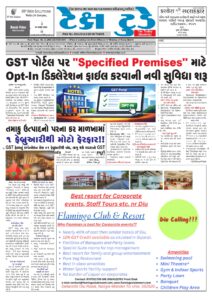GST WEEKLY UPDATE : 36/2022-23 (04.12.2022) By CA Vipul Khandhar

By CA Vipil Khandhar
- GSTR-9 Annual Return Update; Computation of ITC (Table 8A) has been updated based on GSTR-1/IFF/GSTR-5 filed by Supplier upto Nov 30, 2022:-
The Goods and Services Tax Network (“GSTN”) has issued an Update on GSTR-9 Annual Return for Computation of ITC (Table 8A) has been updated based on GSTR-1/IFF/GSTR-5 filed by Supplier upto November 30, 2022:
- Annual return in Form GSTR-9 once filed cannot be revised.
- Computation of ITC has been made based on GSTR-1/IFF/GSTR-5 filed by your corresponding suppliers upto November 30, 2022. GSTR-1/IFF/GSTR-5 filed after the updation date will be covered in the next updation.
- GSTN as Financial Information Provider Reserve Bank of India has included Goods and Service Tax Network (GSTN) as a Financial Information Provider under Account Aggregator Framework:
With a view to facilitate cash flow-based lending to MSMEs, RBI has decided to include Goods and Services Tax Network (GSTN) as a Financial Information Provider (FIP) under the Account Aggregator (AA) framework. Department of Revenue shall be the regulator of GSTN for this specific purpose and Goods and Services Tax (GST) Returns, viz. Form GSTR-1 and Form GSTR-3B, shall be the Financial Information. (Source: RBI Circular No. DoR.FIN.REC 82/03.10.123/2022-23 dated 23.11.2022)
- Processing of IGST Refunds CBIC has issued instructions in relation to manner of processing and sanction of IGST refunds which have been with held in terms of Rule 96 (4 and 5A) of CGST Rules, 2017.:
Accordingly, Rule 96 of the Central Goods and Service Tax Rules, 2017 (hereinafter referred to as ‘CGST Rules’) has been amended retrospectively w.e.f. 01.07.2017 to provide for withholding of IGST refund in cases where the verification of credentials of the exporter, identified on the basis of data analytic including the availment of ITC by the exporter is considered essential before grant of refund. Principal Director General/ Director General of Directorate General of Analytics and Risk Management (DGARM), CBIC, New Delhi has been authorized by the Board to exercise the functions under clause (c) of sub-rule (4) of rule 96 of the CGST Rules vide Order No. 01/2022-GST dated 21.07.2022 issued vide CBIC-20023/04/2021-GST. Rule 96 (5A) has been inserted in rule 96 to provide for transmission of IGST refunds, withheld in terms of provisions of clause (c) of sub-rule (4) of rule 96 of the CGST Rules, as system generated refund in Form GST RFD-01 and to provide that the said system generated form shall be deemed to be the application for refund in such cases and such application for refund shall be deemed to have been filed on the date of such transmission on the portal. Rule 96(5C) has also been inserted in rule 96 to provide that such system generated refund in FORM GST RFD-01 have to be dealt with in accordance with rule 89 i.e. in a manner similar to other GST RFD-01 refund claims. DGARM on the basis of data analysis and risk parameters, would identify the exporters where verification of credentials of the exporter, including the availment of ITC by the exporter, is considered essential before grant of refund. Such refund claims will be made available to the jurisdictional proper officer on back-office system under the category “Any other (GST paid on export of goods)” with the remarks “Refund of IGST paid on export of goods (Refund not processed by ICEGATE)”.
The jurisdictional proper officer shall immediately process such refund claims in a manner similar to other RFD-01 refunds filed under the provisions of rule 89 of the CGST Rules, 2017. These claims would be auto-acknowledged by the system and no Deficiency Memo in Form GS T RFD-03 can be issued against such system generated Form GST RFD-01 refund claims. The proper officer shall ascertain the genuineness of the exporter & verify the correctness of availment and utilisation of ITC by the exporter and exercise due diligence in processing the said refund claims to safeguard interest of revenue. He may conduct the physical verification of places of business of the exporter, if required, to ensure that the exporter is existing at his declared place of business and is functional/active. The proper officer shall pass a detailed speaking order in respect of the refund claim and shall duly upload the same along with the refund sanction order in Form GST RFD-06 on the portal. The officer will also follow the timelines for processing of the refund claim in terms of provisions of section 54(7) of the CGST Act. The procedure of review and post-audit will also be applicable to such refund claims. The SOPs dated 23.01.2020 and 20.05.2020 prescribing the procedure to be followed for verification of the risky exporters and their suppliers, are hereby superseded. [Source: Instruction No. 04/2022-GST dated 28.11.2022 (F.No. CBEC-20/08/02/2020-GST/1377-78) issued by CBIC, GST Policy Wing, Ministry of Finance]
- NEW E INVOICE FAQS
Yes, if you are eligible for e-Invoicing, all the invoices of B2B and Exports need to be registered.
No, there is no time limit for delivery of goods or generation of e-waybill for the e-Invoice.
Yes, if you are eligible for e-Invoicing, all the invoices including RCM invoices issued by the Supplier need to be registered.
Type of GST (whether IGST or CGSTS/SGST) is determined by POS (Place of Supply). If the Supplier state is same as POS, then it is CGSTS/SGST else IGST for B2B transactions.
The e-Invoice for services may be generated like any other invoice, by mentioning related SAC code and the total price in unit rate and the quantity may be mentioned as one.
Ideally, the e-invoice must be generated after preparing the manual invoice and before issuing it to the customer. The system presently allows to register invoices for the previous periods also.
Freight charges may be entered as line items in case there is a GST component or else they may be entered under ‘Other charges’.
No, it is not required. e-Waybill is required only if at least one of the items in the invoice has Goods and the value of invoice exceeds Rs 50 thousand.
Yes, they can be entered. Please refer the schema of the invoice at https://einv-apisandbox.nic.in/version1.03/generate-irn.html#JSONSchema for more details.
No, there is no time limit to prepare the credit notes or debit notes against the e-Invoice.
No, shipping bill number or date is not mandatory for preparing e-invoice.
No, e-Invoice is applicable only if the notified turnover is crossed in the previous years.
Invoice sent to the customer must contain the IRN number and the QR Code. Along with this you may send the regular invoice also.
The e-invoice portal https://gepp.einvoice1.gst.gov.in helps the suppliers in registering the invoices without the necessity for ERP system. This is a browser based and user friendly portal by which the e-invoices can be generated. The application may also be downloaded on to the mobile.
Yes, its applicable. If the customer is of type SEZ, then e-Invoice may be generated using transaction type as SEZWP / SEZWOP by the Supplier.
Ideally, e-invoice must be generated after making the manual invoice and before issuing the invoice to the customer. Presently, system allows for the invoices to be registered for previous period also.
Presently, system allows for the invoices to be registered for previous period. So, if you have missed uploading, then you may still generate e-Invoice for the previous period invoices.
No, supplier cannot upload the digitally signed invoice to the portal. The e-invoice system will digitally sign the e-invoice details uploaded to the portal and return the signed invoice and QR code to the Supplier.
- Where can I find tutorial videos on E-Invoice System?
- You may visit https://einvoice1.gst.gov.in/Others/CBTand https://gepp.einvoice1. gst.gov.in/downloads/Welcometogepp.mp4 to understand the e-Invoice system and GePP-On system.
- Where do I print the QR Code, IRN and Acknowledgement number on the e-Invoice?
There is no specific place for printing the QR Code, IRN and Acknowledgement number on the invoice. However, they should be visible and in case of QR code, it should be possible to scan it.
- How should I generate e-Waybill for carrying goods through train?
- e-waybills may be generated for all the modes of travel such as Road, Train, Air and Ship. In case of train, you may enter the railway receipt number and date instead of vehicle number.
- I’m unable to enter slash ‘/’ in the document number, what should I do?
- Document number in e-Invoice should not be starting with 0, / and -. You should pass the document number without such characters.
- Whether manual invoice with USD/EURO Currency and E-Invoice with INR be used? (Or)
Can we upload export invoice details with foreign currency? - All invoices to be registered on the portal should contain the values in INR, however there are some optional fields in the schema in which the foreign currency may be included.
Please refer the schema at https://einv-apisandbox.nic.in/version1.03/generate-irn.html#JSONSchema
- CBIC extends IGST and Compensation Cess Exemption to Goods Imported against AA/EPCG authorizations till 31st March-2023:
The Central Board of Indirect Taxes and Customs (CBIC) has extended the exemption from Integrated Tax (IGST) and Compensation Cess on goods imported against AA/EPCG authorizations till 31st March 2022. A notification issued on Tuesday regarding this stated that “In exercise of the powers conferred by sub-section (4) of section 51A of the Customs Act, 1962 (52 of 1962), the Central Board of Indirect Taxes and Customs, on being satisfied that it is necessary and expedient to do so, hereby amends the notification No.19/2022-Customs (N.T.) dated the 30th March 2022, published in the Gazette of India, Extraordinary, Part II, Section 3, Sub-section (ii) vide S.O. 1512 (E), dated the 30th March, 2022, namely, – In the said notification, in clause 2, for the figures, letters and word “30th November, 2022”, the figures, letters and word “1st April, 2023”, shall be substituted.”
Disclaimer:
This publication contains information for general guidance only. It is not intended to address the circumstances of any particular individual or entity. Although the best of endeavor has been made to provide the provisions in a simpler and accurate form, there is no substitute to detailed research with regard to the specific situation of a particular individual or entity. We do not accept any responsibility for loss incurred by any person for acting or refraining to act as a result of any matter in this publication.
(Author is a well know Chartered Accountant Practicing in the field of Direct and Indirect Taxation at Ahmedabad)




